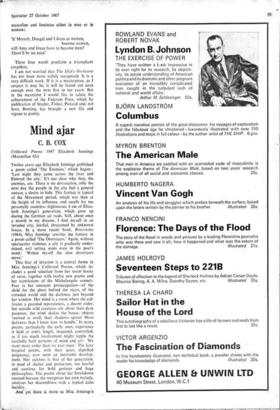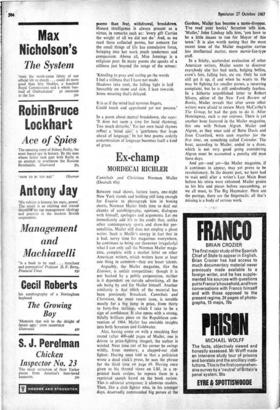Mind ajar
C. B. COX
Twelve years ago Elizabeth Jennings published a poem called 'The Enemies,' which begins: 'Last night they came across the river and Entered the city.' It's not clear who they, the enemies, are. There is no devastation, only the next day the people in the city feel a general unease, a desire to hide. This fantasy is typical of the Movement period, which was then at the height of its influence, and recalls for me personally countless nightmares. I am of Eliza- beth Jennings's generation, which grew up during the German air raids. Still, about once a month in my dreams, I find myself in an invaded city, fearful, threatened by unknown forces. In a more recent book, Recoveries (1964), Miss Jennings rewrites the fantasy in a poem called 'The Destroyers.' Again, without spectacular violence, a city is gradually under- mined, evil setting seeds even in the poet's mind: 'Within myself the slow destroyers move.'
This fear of invasion is a central theme in Miss Jennings's Collected Poems, which in- cludes a good selection from her seven books of verse, together with twelve new poems and her translations of the Michelangelo sonnets. Fear is her constant preoccupation—of the child for the ghost behind the stairs, of the crowded world and the darkness just beyond her window. Her mind is a room where she cul- tivates a guarded separateness, a decent order, but outside wild creatures stir about their dark purposes, the wind shakes the house, objects 'seemed to swell, their shadows spread More darkness than I knew how to handle.' In many poems, particularly the early ones, experience is held at arm's length. inspected, controlled, as if too much involvement might topple the carefully built patterns of mind and art: 'We want more order than we ever meet.' The later hospital poems, with their quiet, dignified poignancy, now seem an inevitable develop- ment. Her sickness is that of her generation, in need of shelter and protection, too fearful and cautious for bold gestures and huge philosophies. The poems about her breakdown succeed because she recognises her own malady, analyses her discomfiture with a typical calm lucidity.
And yet there is more to Miss Jennings's
poems than fear, withdrawal, breakdown. Honest intelligence is always present as a virtue, in remarks such as: 'every gift Carries the weight of all we did not do.' And, as we read these collected poems, her concern for the small things of life has cumulative force, bringing into her work much tenderness and compassion. Above all, Miss Jennings is- a religious poet. In many poems she speaks of a stillness just beyond the range of the senses: 'Kneeling to pray and resting Q n the words I feel a stillness that I have not made.
Shadows take root, the falling light is laid Smoothly on stone and skin. I lean towards Some meaning that's delayed.
It is as if the mind had nervous fingers,
Could touch and apprehend yet not possess.'
In a poem about mental breakdown, she says: 'It does not seem a time for lucid rhyming; Too much disturbs.' Yet her own lucid rhymes reflect a 'mind ajar,' a 'gentleness that leaps ahead of language.' In her best poems orderly concentration of language becomes itself a kind of grace.











































 Previous page
Previous page